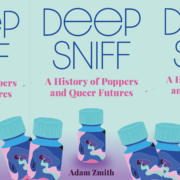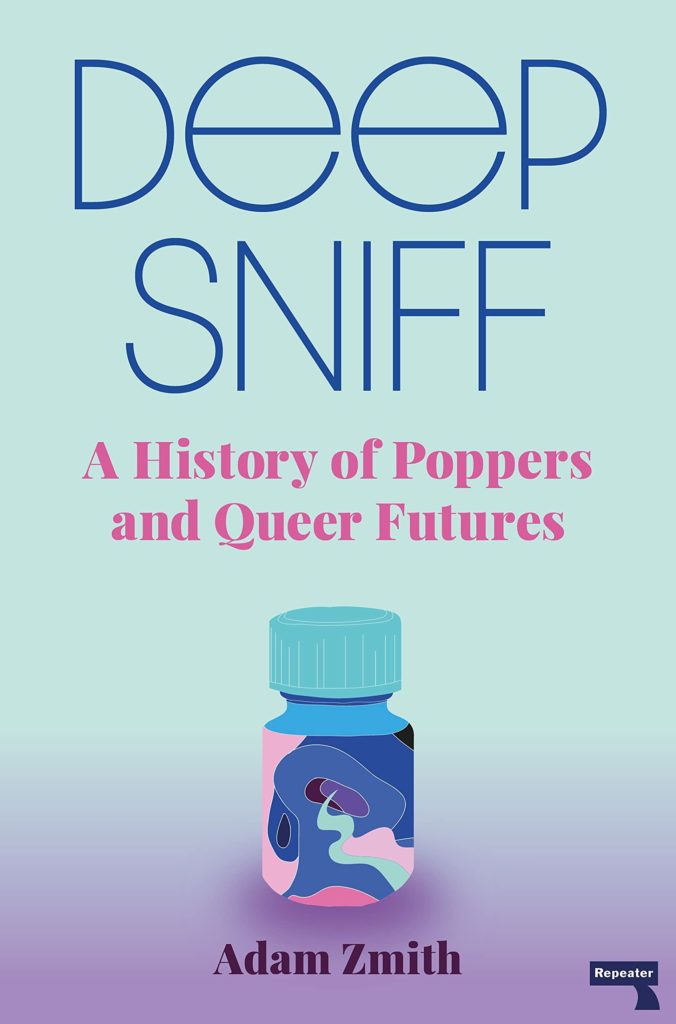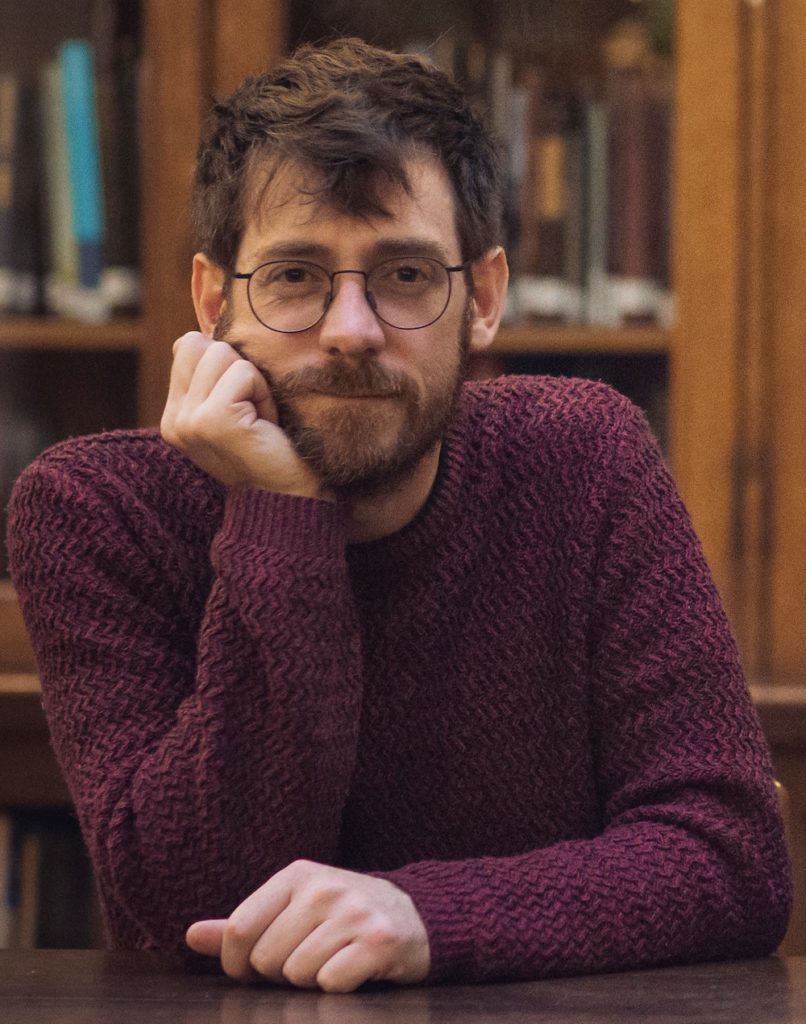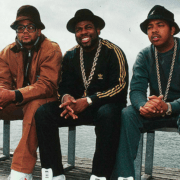Deep Sniff: A History of Poppers and Queer Futures by Adam Zmith.

Deep Sniff explores the uses of poppers and how they found their way from the laboratory into pharmacies.
Contribution by Lauren Hurrell.
In this book, Adam Zmith explores the rising popularity of the use of poppers in the queer community through time. The result of this astute enquiry into the history of amyl nitrite is something quite special, as Zmith’s book becomes coined, rightfully so, a manifesto for pleasure.
Deep Sniff explores the uses of poppers and how they found their way from the laboratory into pharmacies. They were known most commonly at first to have had medicinal qualities to assist cardiac issues in the Victorian infirmary. Poppers subsequently made their way into the sex clubs of the 1970s, queer social circles, corner shops and bedrooms. This is the tale of how amyl and other nitrates had the power to unlock queer potential, and accordingly, pleasure.
This highly researched book neither directly promotes nor condemns the use of poppers. Rather, it explains to us how their use influenced queer culture, as Zmith highlights, predominantly through the heightened opportunities of connection – to experience encounters with people in ways that were considered unconventional, private or taboo at the time. Between sodomy laws, AIDS, and the varying oppressive attacks on queer people in the US, the UK and beyond, the uses of poppers were a way to seek connection in dark rooms without needing much else. In these spaces, it did not matter who you were.
Deep Sniff combines the study of medical history with politics and activism in exploring the commercialisation of poppers. It outlines how different brands of poppers became synonymous with a particular sub-culture in queer spheres and why. Through this lens, Zmith debunks outdated stereotypes that were dwelling among these queer subcultures, highlighting their oppressive contradictions in modern queerness. He ruminates on how gender identity and meanings of masculinity should be unzipped and how poppers have played a powerful role in doing so.
What adds to the tone of the book is the way that Zmith interjects his own thoughts and feelings alongside his astute research into the subject, blurring the lines between clinical research and personal essay. This helps us to delve deeper into the heart of the thesis – the discovery of pleasure and connection without boundaries.
Zmith gives mention to queer artists or writers, quoting Richard Scott, author of the poetry collection titled Soho from his epic poem “Oh my Soho”: ‘I have spent my life drunk, poppered up…’ Through this moment, Zmith exposes the power of poppers as a tool to unlock the self through their work. To Scott’s poem, Zmith responds, ‘I do not see [Richard] Scott’s persona as corroded… I see him as full of potential, full of his own biopolitical power’.
Zmith describes the experience of being ‘poppered up’ as ‘seeking connection, and with the idea of the self falling away.’ Through an overview of the British and American press throughout the 1980s, Zmith also carefully interrogates the tenuous links made ‘between poppers, gay sex and the patients with these unusual sickness’, which came to be the catastrophic AIDS crisis. It was here when doctors in the US and the UK began to draw parallels between ‘the recreational habits of gay men’ where the ‘immunocompromise syndrome has been found,’ as if gay sex was the only way such an illness could be spread. This ignored the fact that AIDS did not discriminate between gender or sexuality and could also be transmitted via intravenous drug use.
The book also delves into familiar and unknown queer history and unearths the police’s dark history of persecuting ‘men who had sex with each other’. One example tells the police raiding of London’s Royal Vauxhall Tavern while wearing surgical gloves in the 1970s. These spaces, despite the raids, were spaces in which queer utopia could be chronicled and performed. Queer performance is a place where artists ‘can invert the power dynamics that usually hold them down,’ says, Smith, ‘just as [Jade] Pollard-Crowe parodied the gloved policemen.’ These spaces rallied for resilience again and again, as a place where queer people could connect through disco, dance and, oftentimes, drugs.
Zmith depicts the use of drugs as a frequent accompaniment in utopia of sexual and bodily freedom in queer history. He unearths the presence of poppers in popular culture, from a publicised moment between Sam Smith and Nicole Scherzinger in 2020, which she was celebrated as an ally by LGBTQ+ news platform Pink News for using poppers, to Jessica Fletcher’s mention of amyl nitrite more than once in Murder, She Wrote. Zmith even likens poppers to his personal feelings towards cult classics such as Star Trek, highlighting how queer utopia could be reflected and related to in the possibilities that sci-fi genres enabled.
Zmith delves into his own past of sexual experiences and highlights Garth Greenwell’s novel Cleanness in which a dom-sub dynamic allows two queer individuals to transcend the stigmas and oppression that bind them – how the sexual release is a gateway to a queer utopia in which a bond is formed. Sometimes those bonds require contrasts or opposites that meet in a union.
In the latter part of the book, Zmith highlights the statement issued by the Black feminist women who comprised the Combahee River Collective, a Black feminist lesbian socialist organisation in 1977: ‘…If Black women were free, it would mean that everyone else would have to be free since our freedom would necessitate the destruction of all the systems of oppression. This really holds weight as the main criteria of the manifesto Zmith has cultivated in Deep Sniff, as the author leaves us with the thoughts of what queer utopia means to ourselves and the bodies that hold us.
Zmith gives credit to SOPHIE, the musician and singer who tragically died in January this year, as our guide to queer utopia: ’I don’t mean a destination or even a time. I mean a feeling. Queer utopia is the feeling that your body is yours, it’s free and full of potential, and it’s not poisoned by anyone or their ideas.’
‘Whatever his show of gender, his aim was freedom. Poppers were just the potion’
Deep Sniff is out now!
Contribution by Lauren Hurrell.
Check out the GUAP Arts & Culture section, to discover new art, film, and creative individuals.





![ZINO VINCI’S ‘FILTHY & DISGUSTING’EP BRINGS YOU TO THE CORE OF THE ARTIST [@ZinoVinci]](https://guap.co/wp-content/uploads/2023/10/Zino-4.jpg)







![Remel London’s [@Remel_London] “Mainstream” is a must attend for upcoming presenters!](https://guap.co/wp-content/uploads/2017/02/REMEL-LONDON-FLYER-FINAL-YELLOW-COMPLETE-1.png)